Unit 1 Will people have robots Section A教学课件(鲁教五四制 八上)
unit1-will-people-have-robots说课稿市公开课一等奖课件名师大赛获奖课件

1. Five years 2. Today, Sally ago, Sally is_i_n_c_o_l_le_g_e_. was__in__hi_g_h_
_s_ch_o_o_l_ .
3.In five years, Sally will be_a_ _d_o_c_to_r_.
• Writing
普通将来时(the simple future tense) 普通将来时表达将来某个时间要发生的动作或存
在的状态,也表达将来经常或重复发生的动作, 常与表达将来的时间状语连用,如: tomorrow, next week, next year等。 例如:我们每个星期来看你。
We will come to see you every Sunday.
Will 与be going to 的区别: will表达纯正的将来, 如:It will rain tomorrow. 明天即将会下雨。 be going to表达打算、决定、计划要做的事, 如;
What are you gong to do next Sunday? 下星期天你打算干什么?
• Writing
• Listening
Listen and circle the predictions you hear.
√1. People will have robots in their homes. 2√. People won’t use money. Everything will be free. 3. Books will only be on computers, not on paper. 4√. Kids won’t go to school. They’ll study at home on computers. 5√. There will only be one country. 6. People will only live to be 200 years old.
2012年新人教版英语七年级上册Goforit【上】1-4单元(1-4课文+翻译)

Unit 1 Will p eople have robots? 人们将会有机器人吗?Section A —1b(P1)Conversation 1(对话1)A: Good morning! I’m Cindy. 早上好!我是辛迪。
B: Hello, Cindy. I’m Dale. 你好,辛迪。
我是戴尔。
A: Nice to meet you. 很高兴认识你。
Conversation 2(对话2)A: What’s your name? 你叫什么名字?B: Alan. 艾伦。
A: Hello, Alan! I’m Ms Brown. 你好,艾伦!我是布朗。
Conversation 3(对话3)A: Hi, my name’s Gina. 你好,我的名字叫吉娜。
B: I’m Jenny. Nice to meet you. 我是珍妮。
很高兴认识你。
A: Nice to meet you, too. 我也很高兴认识你。
2a & 2b(P2)Conversation1A: Hello, what’s your name? 你好,你叫什么名字?B: My name’s Alice. 我的名字叫艾丽斯。
A: I’m Eric. 我是埃里克。
B: Nice to meet you. 很高兴认识你。
Conversation 2A: What’s his name? 他叫什么名字?B: His name’s Eric. 他名叫埃里克。
A: And what’s her name? 她的名字又叫什么呢?B: Her name’s Alice. 她名叫艾丽斯。
Conversation 3A: Excuse me, are you Eric? 请问你是埃里克吗?B: Y es, I am. Are you Mike? 是的,我是。
你是迈克吗?A: No, I’m not. I’m Bob. Nice to meet you. 不,我不是。
初中英语Unit1 Will people have robots单元教学设计思维导图
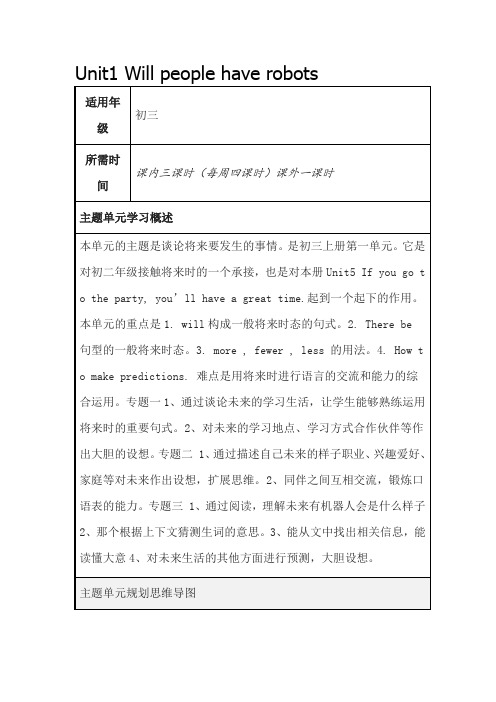
主题单元学习目标
知识与技能:1、能听说读写核心词汇和短语2、对未来进行预测,陈述表达自己的观点3、能在任务型活动中如:游戏、调查、预测未来生活等活动中用一般过去式、一般现在时、以及由will构成的一般将来时进行交流。
过程与方法:通过谈论未来的生活,提高口语能力和相互交流的能力。
2、在多媒体资源的帮助下,锻炼听说读写能力。
3、阅读文章使用阅读技巧,锻炼阅读理解能力,分析问题解决问题的能力。
4、能够写一篇英语小短文。
情感态度与价值观:通过任务活动,学会交流,学会尊重,提高人际交往能力。
2、通过活动中对未来生活的展望,学会积极的处理好人与人,人与社会,人与自然的基本关系。
学会保护环境,防止环境污染。
对应课标。
八年级英语下册 Unit1《Will people have robots》机器人简介文字素材 人教新目标版
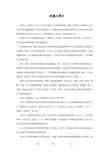
机器人简介实用上,机器人(Robot)是自动执行工作的机器装置。
机器人可接受人类指挥,也可以执行预先编排的程序,也可以根据以人工智能技术制定的原则纲领行动。
机器人执行的是取代或是协助人类工作的工作,例如制造业、建筑业,或是危险的工作。
机器人可以是高级整合控制论、机械电子、计算机、材料和仿生学的产物。
目前在工业、医学甚至军事等领域中均有重要用途。
欧美国家认为:机器人应该是由计算机控制的通过编排程序具有可以变更的多功能的自动机械,但是日本不同意这种说法。
日本人认为“机器人就是任何高级的自动机械”,这就把那种尚需一个人操纵的机械手包括进去了。
因此,很多日本人概念中的机器人,并不是欧美人所定义的。
现在,国际上对机器人的概念已经逐渐趋近一致。
一般说来,人们都可以接受这种说法,即机器人是靠自身动力和控制能力来实现各种功能的一种机器。
联合国标准化组织采纳了美国机器人协会给机器人下的定义:“一种可编程和多功能的,用来搬运材料、零件、工具的操作机;或是为了执行不同的任务而具有可改变和可编程动作的专门系统。
”机器人能力的评价标准包括:智能,指感觉和感知,包括记忆、运算、比较、鉴别、判断、决策、学习和逻辑推理等;机能,指变通性、通用性或空间占有性等;物理能,指力、速度、连续运行能力、可靠性、联用性、寿命等。
因此,可以说机器人是具有生物功能的空间三维坐标机器。
机器人发展简史(引自《环球科学》2007年第二期)1920年捷克斯洛伐克作家卡雷尔•恰佩克在他的科幻小说《罗萨姆的机器人万能公司》中,根据Robota(捷克文,原意为“劳役、苦工”)和Robotnik(波兰文,原意为“工人”),创造出“机器人”这个词。
1939年美国纽约世博会上展出了西屋电气公司制造的家用机器人Elektro。
它由电缆控制,可以行走,会说77个字,甚至可以抽烟,不过离真正干家务活还差得远。
但它让人们对家用机器人的憧憬变得更加具体。
1942年美国科幻巨匠阿西莫夫提出“机器人三定律”。
人教版八年级英语下册《nit 1 Will people have robots. Section B》教案_19
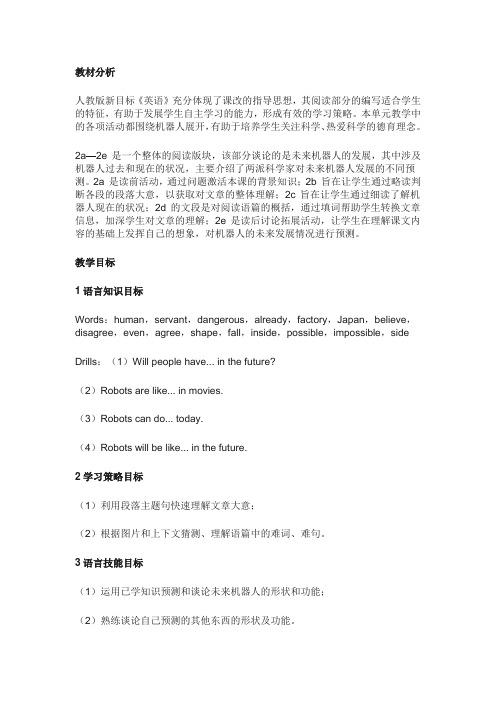
教材分析人教版新目标《英语》充分体现了课改的指导思想,其阅读部分的编写适合学生的特征,有助于发展学生自主学习的能力,形成有效的学习策略。
本单元教学中的各项活动都围绕机器人展开,有助于培养学生关注科学、热爱科学的德育理念。
2a—2e 是一个整体的阅读版块,该部分谈论的是未来机器人的发展,其中涉及机器人过去和现在的状况,主要介绍了两派科学家对未来机器人发展的不同预测。
2a 是读前活动,通过问题激活本课的背景知识;2b 旨在让学生通过略读判断各段的段落大意,以获取对文章的整体理解;2c 旨在让学生通过细读了解机器人现在的状况;2d 的文段是对阅读语篇的概括,通过填词帮助学生转换文章信息,加深学生对文章的理解;2e 是读后讨论拓展活动,让学生在理解课文内容的基础上发挥自己的想象,对机器人的未来发展情况进行预测。
教学目标1语言知识目标Words:human,servant,dangerous,already,factory,Japan,believe,disagree,even,agree,shape,fall,inside,possible,impossible,side Drills:(1)Will people have... in the future?(2)Robots are like... in movies.(3)Robots can do... today.(4)Robots will be like... in the future.2学习策略目标(1)利用段落主题句快速理解文章大意;(2)根据图片和上下文猜测、理解语篇中的难词、难句。
3语言技能目标(1)运用已学知识预测和谈论未来机器人的形状和功能;(2)熟练谈论自己预测的其他东西的形状及功能。
3情感教育、文化意识目标(1)培养学生关注科技、热爱科技、参与科技的意识;(2)能在小组活动中积极与他人合作,发扬团队合作精神。
(3)了解机器人的发展史和发展趋势;(4)关注当今世界科技发展的热点问题,培养创造性思维能力。
新目标英语八年级Go for it下册1-5单元 (Units 1-5课文 翻译)
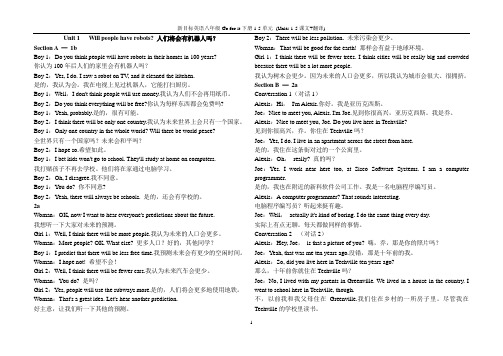
Unit 1 Will people have robots? 人们将会有机器人吗?Section A —1bBoy 1:Do you think people will have robots in their homes in 100 years?你认为100年后人们的家里会有机器人吗?Boy 2:Yes, I do. I saw a robot on TV, and it cleaned the kitchen.是的,我认为会。
我在电视上见过机器人,它能打扫厨房。
Boy 1:Well,I don't think people will use money.我认为人们不会再用纸币。
Boy 2:Do you think everything will be free?你认为每样东西都会免费吗?Boy 1:Yeah, probably.是的,很有可能。
Boy 2:I think there will be only one country.我认为未来世界上会只有一个国家。
Boy 1:Only one country in the whole world? Will there be world peace?全世界只有一个国家吗?未来会和平吗?Boy 2:I hope so.希望如此。
Boy 1:I bet kids won't go to school. They'll study at home on computers.我打赌孩子不再去学校。
他们将在家通过电脑学习。
Boy 2:Oh, I disagree.我不同意。
Boy 1:You do? 你不同意?Boy 2:Yeah, there will always be schools. 是的,还会有学校的。
2aWoman:OK, now I want to hear everyone's predictions about the future.我想听一下大家对未来的预测。
Unit 1 Will people have robots
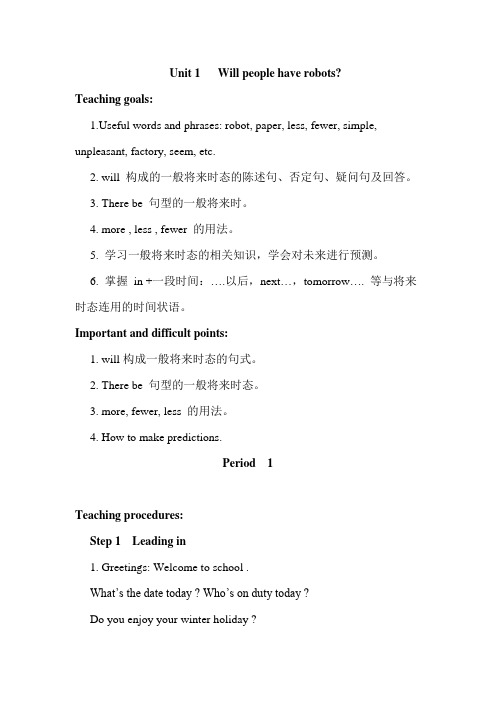
Unit 1 Will people have robots?Teaching goals:eful words and phrases: robot, paper, less, fewer, simple, unpleasant, factory, seem, etc.2. will 构成的一般将来时态的陈述句、否定句、疑问句及回答。
3. There be 句型的一般将来时。
4. more , less , fewer 的用法。
5. 学习一般将来时态的相关知识,学会对未来进行预测。
6. 掌握in +一段时间:….以后,next…,tomorrow…. 等与将来时态连用的时间状语。
Important and difficult points:1. will构成一般将来时态的句式。
2. There be 句型的一般将来时态。
3. more, fewer, less 的用法。
4. How to make predictions.Period 1Teaching procedures:Step 1 Leading in1. Greetings: Welcome to school .What’s the date today ? Who’s on duty today ?Do you enjoy your winter holiday ?Do you finish your homework ?Do you want to live on the moon ?Can you guess what will happen in ten years ?Collect the Ss’ answers and say something about their predictions.Step 2 Pre-taskSB Page 2, 1a.1. Look at the picture: How will the world be different in the future, 100 years from now ?We’re going to talk about sth. in 100 years.2. Read each predictions to the class .Explain the new vocabulary .3. Read the instructions .Make sure Ss know what they should do .4. Do it by themselves.5. Talk about the answers with the class.Explain :一般将来时态构成: will / be going to + 动词原形Step 3 While-taskSB Page 2 ,1b .1. Practise reading the six predictions.2. Read the instructions to Ss. Circle the things you hear on the recording.3. Play the tape twice.4. Play the tape a third time .At the same time, check the answers.SB Page 2 , 1c .1. Pay attention to the dialogues.2. Read the dialogues fluently.3. Pairwork. Work in pairs to make predictions according to the sample.4. Ask several pairs to share their conversations to the class.SB Page 3, 2a & 2b.1. Read the predictions.2. Read the instructions and point out the sample answer.3. Play the tape twice. Ss circle the word they hear in each sentences: more, less , fewer.4. Check the answers.学生探究: less, fewer 的区别。
Unit 1 Will people have robots
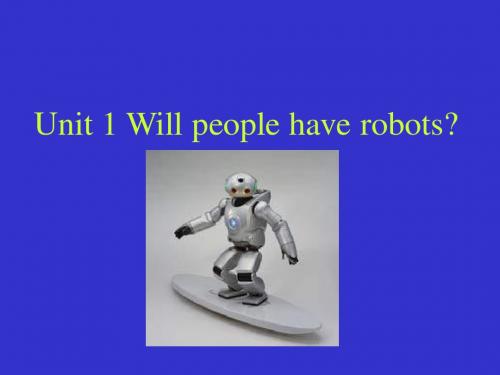
Activity 3a
Do this part following the structure.
A task
Get the students to do a survey about their best friends and finish the following chart.
Five years ago He was…. He played…. He had…. Today He is …. He plays…. He has…. In five years He will be…. He will play…. He will have….
Pairwork
Change the predictions into questions and ask each other these questions. For example: Will there be less free time in the future? No, there won’t. There will be more free time. Because robots will do a lot for people.
ห้องสมุดไป่ตู้
意思 few little many much 一些(否 定) 一些(否 定) 许多
用法 修饰可数 名词 修饰不可 数名词 修饰可数 名词 修饰不可 数名词
比较级 fewer less more more
最高级 fewest least most most
许多
Activity 2b
_____ 1. There will be fewer people. _____ 2. There will be less free time. _____ 3. People will use the subways less. _____ 4. There will be more pollution. _____ 5. Cities will be very big and crowded.
- 1、下载文档前请自行甄别文档内容的完整性,平台不提供额外的编辑、内容补充、找答案等附加服务。
- 2、"仅部分预览"的文档,不可在线预览部分如存在完整性等问题,可反馈申请退款(可完整预览的文档不适用该条件!)。
- 3、如文档侵犯您的权益,请联系客服反馈,我们会尽快为您处理(人工客服工作时间:9:00-18:30)。
use the subways less
more
In 100 years
People will use the subways less. A: Will people use the subways less? B: Yes, they will. / No, they won’t.
There will be more people.
___A___D 4.Kids won’t go to school. They’ll study at home on computers. ___A___D 5.There will be only one country. ___A___D 6.People will live to be 200 years old.
Will students study at home on computers ?
Yes ,they will. They will study at home on computers. No ,they won’t.
Will every home have a car?
Free talk:
I think
I don’t think
There will be one country in… . A: Will there be one country in…? B: Yes, there will. No, there won’t.
1b. Listen and circle the predictions you hear in activity 1a.
Kids won’t go to school. They will study at home on computers.
In 100 years
A: Will kids go to school in…?
B: No, they won’t. Because they will study at home on computers.
Make dialogues of 1a.
I think
I don’t think
People will have robots in their homes.
In the future
A: Will people have robots in their homes in the future?
___A___D 1.People will have robots in their homes. ___A___D 2.People won’t use money. Everything will be free.
___A___D 3.Books will only be on computers, not on paper.
free
People won’t use money.
Everything will be free.
In the future
A: Will people use money in the future? B: No, they won’t. Because everything will be free.
Our city will be very big and crowded.
In 100 years
our city
big and crowded
A: Will our city be very big and crowded in 100 years? B: Yes, it will. No, it won’t.
B: Yes, they will. / No, they won’t.
I think
I don’t think
People will live to be 200 years old.
In the future
A: Will people live to be 200 years old? B: Yes, they will./No, they won’t. live to be +基数词 “ 活到多少岁”
Books will only be on computers, not on paper.
In 100 years
A: Will books only be on paper in…? B: No, they won’t. Because they will be on computers.
In 100 years
How will the world be different in the future, 100
years from now? Could you make some
predictions(预言)? Please talk with your partner.
Dialogue
A: Do you think there will be robots in people’s homes?there be more people in… A: Will ___________________________? Yes, there will. B: _____________ A: Will there be fewer people in…? B: No, there won’t.
Unit 1
Will people have robots? Section A
What do you think the life will be like in 100 years?
Will people have robots in their homes ? Yes, they will. People will have robots in their homes. No, they won’t.(=will not) People won’t have any robots in their homes.
B: Yes , there will. I think every home will have a robot. A: Will kids go to school? B: Kids won’t go to school.
They will study at home on computers.
